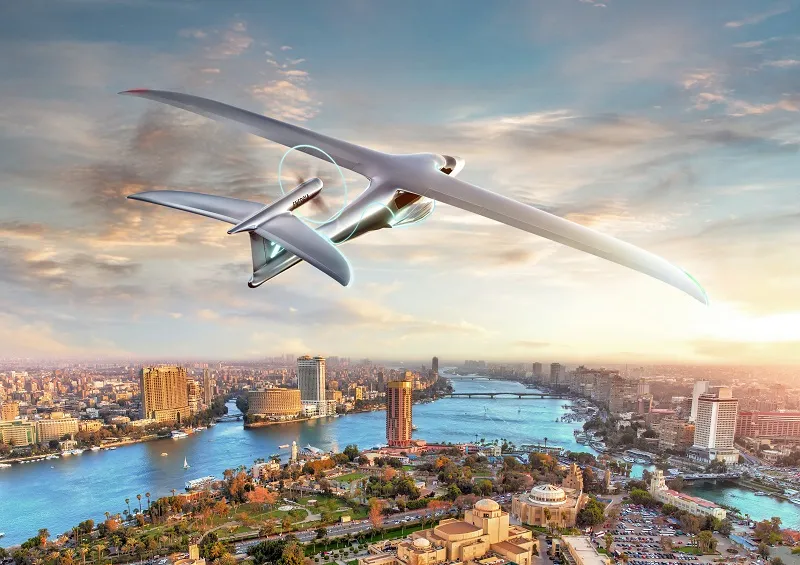
Embraer unveils zero-emission hydrogen and electric concept aircraft
Nov 08, 2021

Embraer has introduced a groundbreaking concept aircraft powered by hydrogen and electricity, marking a significant step towards sustainable aviation. This innovative design aims to reduce the environmental impact of air travel, aligning with global efforts to achieve net-zero carbon emissions. The aircraft features advanced technologies that optimize energy efficiency and minimize noise, showcasing Embraer's commitment to eco-friendly aviation solutions. With a focus on the future of flight, the company envisions this zero-emission aircraft as a viable option for regional and urban transportation, paving the way for a cleaner, more sustainable aviation industry.
Embraer, the Brazilian aerospace giant, has taken a significant step towards sustainable aviation with the unveiling of its "zero-emission hydrogen and electric concept aircraft". This innovative approach is set to revolutionize the industry by offering a cleaner alternative to traditional aviation fuels. In this article, we’ll explore the features of this groundbreaking aircraft, its potential impact on the environment, and what it means for the future of air travel.
Key Features of the Concept Aircraft
The new concept aircraft from Embraer is designed with cutting-edge technology that emphasizes sustainability and efficiency. Here are some of the key features:
| Feature | Description |
|---|---|
| Zero Emissions | The aircraft utilizes hydrogen fuel cells and electric propulsion systems, eliminating harmful emissions. |
| Design Efficiency | Aerodynamic design enhances fuel efficiency and reduces drag, contributing to lower energy consumption. |
| Modular Configuration | The aircraft can be adapted for various ranges and passenger capacities, making it versatile for different markets. |
| Advanced Materials | Lightweight materials are used in construction to improve performance and reduce energy requirements. |
Environmental Impact
The introduction of the "zero-emission hydrogen and electric concept aircraft" represents a monumental shift in reducing the carbon footprint of aviation. As the world grapples with climate change, the aviation sector is often criticized for its significant contributions to greenhouse gas emissions. According to reports, aviation accounts for approximately 2-3% of global CO2 emissions. By adopting hydrogen and electric technologies, Embraer aims to mitigate these environmental concerns.
The Role of Hydrogen in Aviation
Hydrogen fuel has gained momentum as a viable alternative to conventional aviation fuels. When used in fuel cells, hydrogen reacts with oxygen to produce electricity, with water as the only byproduct. This clean process is pivotal in achieving the ambitious "sustainability goals" set by governments and organizations worldwide. Moreover, hydrogen can be produced from renewable sources, further enhancing its environmental benefits.
Challenges Ahead
While the potential of hydrogen and electric aircraft is immense, several challenges remain. Infrastructure development for hydrogen production and distribution is critical. Airports will need to invest in facilities to support hydrogen fueling, which requires significant financial resources and planning. Additionally, regulatory frameworks must evolve to accommodate these new technologies, ensuring safety and efficiency in operations.
Market Potential and Future Developments
The market for sustainable aviation technologies is rapidly growing. With increased consumer awareness and demand for eco-friendly travel options, airlines are under pressure to adopt greener practices. Embraer’s "zero-emission hydrogen and electric concept aircraft" positions the company at the forefront of this shift.
In a recent survey, a significant percentage of travelers expressed a willingness to pay more for flights on environmentally friendly aircraft. This trend suggests that airlines incorporating sustainable technologies could gain a competitive advantage. Below is a chart illustrating consumer attitudes towards sustainable aviation:
| Consumer Opinion | Percentage |
|---|---|
| Willing to pay more for eco-friendly flights | 68% |
| Prefer airlines with sustainability initiatives | 72% |
| Concerned about aviation's environmental impact | 85% |
Conclusion
Embraer's unveiling of the "zero-emission hydrogen and electric concept aircraft" marks a pivotal moment in the evolution of aviation technology. As the industry seeks solutions to combat climate change, innovations like this are essential. The potential environmental benefits, combined with growing consumer demand for sustainable practices, position Embraer as a leader in the future of aviation.
Investing in research and development of hydrogen and electric technologies will not only benefit the environment but also pave the way for a new era of air travel that prioritizes sustainability. As we look to the future, it is clear that the aviation industry is on the brink of a transformative shift, with zero-emission aircraft at the forefront of this movement.
Related Articles

Explore Thailand: The Best Islands to Visit for Paradise, Adventure, and Relaxation

The Ultimate Guide to the Best Islands in Thailand for Your Next Getaway

Do babies need passports? How to get a passport for a newborn

How to get a U.S. passport fast: here’s how to expedite the process

What is Mobile Passport Control: 5 reasons why you should use it

SENTRI vs. Global Entry: A detailed guide

Do you need a passport to go to the Bahamas? Let’s find out

Do you need a passport to go to Mexico? A detailed guide

Do you need a passport to go to Canada? We got the answer

Do You Need a Passport for a Cruise: An Essential Travel Guide

Booster Seat Requirements: All the Rules to Follow in Your Rental Car

What Are the World’s Most Powerful Passports, and How Does Yours Rank?

How to Take a Passport Photo at Home: A Helpful Guide

You've got to have heart! Southwest's new livery

Your opinion: Should water be free on low cost carriers?

Young women bolder than guys as solo travellers
